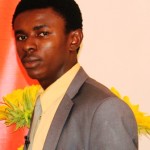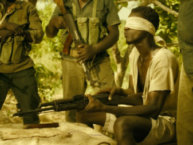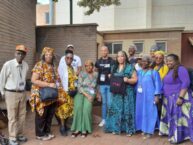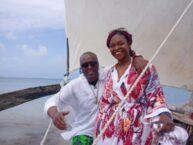 Obinna Udenwe is the author of the award-winning Satans & Shaitans – a conspiracy crime fiction on terrorism, politics and love.He is one of the few African writers fearless enough to delve into controversial issues. In 2015, he eroticised the Nigerian church in fiction in a series titled Holy Sex, published to wide readership and criticism and which won the Nigerian Writers Awards in January 2016.
Obinna Udenwe is the author of the award-winning Satans & Shaitans – a conspiracy crime fiction on terrorism, politics and love.He is one of the few African writers fearless enough to delve into controversial issues. In 2015, he eroticised the Nigerian church in fiction in a series titled Holy Sex, published to wide readership and criticism and which won the Nigerian Writers Awards in January 2016.
To Borrow From a Deity
Nnamdi was one of those men that lived for every minute. He had no care for the future. Once, he told his friends that to think too much about the future was like concentrating so much on the kind of food a wife was preparing at home, while you were out with your friends drinking ngwo – to think like that could give a man headache and early heart attack, for when you wanted egusi soup, she could decide to prepare achara, which was your worst meal. That was how Nnamdi thought, in fact, he once gave all his month’s earning to a woman he picked by the roadside, who had just told him that she was abandoned by her man and she had a baby at her breasts. Tell me, what kind of man would do that these days? Knowing that women were created to come to the world and tell lies to men to get by?
Nnamdi lived in a two room apartment, sparsely furnished, and ate out mostly. In fact, he owned no stove, or cooker or pots or cutleries. What was the use? He would ask you if you visited him. His apartment had four plastic chairs, the very cheap ones, the kind that a child would decline sitting on, there was a glass centre table in his sitting room, and a mattress on the floor. Just a mattress and a huge bag that contained his cloths, all of them, there was no hanger, none of such. He didn’t own anything his mates had in their homes, if where he lived was to be called a home, for home was a place where one returned to for rest and leisure and peace of mind. In his house there was no peace of mind, in the evenings, his father’s ghost would visit him, whether the ghost came to haunt him or to be with him, no one could tell, but what all his friends knew was that a certain ghost, whom he claimed was his father’s lived in his house.
Each time he returned from work, usually, he returned close to midnight, because from work he would visit the beer-bars, he knew all the bars in town, so whenever he returned, he would vomit in his tiny toilet and sleep on the floor of the toilet if he was too drunk to get to the room. He could sleep, sitting on one of the plastic chairs or on the floor or standing, reclining on the wall. He could do that. It was that pathetic. Let me not bore your curiosity anymore with this wretched fellow for you may not understand what he was passing through, if your father had never gone to some juju, seeking to become wealthy, without any money on him but borrowed some money from the juju men to buy the sacrificial items and when he couldn’t pay back…. Well here is how this story goes.
At the time when Nnamdi was still in senior high school, during this time that I tell you, people desperate to become rich sought the assistance of native diviners who lived in far away villages or forests, dressed in tattered clothes and operated in makeshift plank houses, decorated with skulls of various animals and bones, diviners whose half of their faces were covered in nzu and their eyes circled with uri and their heads shaved this way or that, men who wore hides or a piece of wrapper around their waists and chewed bitter herbs endlessly. At this time, men would visit these kinds of diviners who were themselves wretched but could make a rat richer than the bishop of the church where it lived or a street beggar rise to stardom by the wink of an eye. Some of the men that visited these diviners were men who had love for women and wanted to impress them, so they would visit the diviners and sacrifice the heads of their mothers or fathers, and each morning, millions of naira notes would appear under their beds. Some would gift confectionaries to kids returning from schools, turn them to fowls and haul them to the forests in exchange for car trunks filled with dollars or pound sterling or naira notes, millions of them. It was around this time as we now know, that Nnamdi’s father who was into the business of motorcycling sought riches.
For years Nnamdi’s father had been in this business, all he did every morning was wake up, and drive about town with his motorcycle, transporting passengers to wherever they wanted. At the end of the day he would account for two hundred naira or three hundred naira if luck was on his side. The business was a hectic one for it brought headache or pneumonia as he worked under the sun or in the rain. The good thing was that he got to transport all kinds of people; children, adults, the obese and the voluptuous women whose breasts jiggled and bounced at his back as he rode, forcing him to forget that he had family at home.
Then came a day that Nnamdi’s father took a man to a place called Osopong, to a compound filled with small, small huts and whose over ten trees therein were decorated with skulls and shells and bones and pieces of cloths. After this first trip, more came. Each time he conveyed some of his passengers to these kind of places, especially to Osopong, he would sit on a bench at the extreme of the compound and eavesdrop as the passenger deliberated with the diviners, telling them about this or that problem, or paying obeisance for wealth received, bringing forth, gifts of rams and goats and cows and drinks and money.
So one day, Nnamdi’s father decided that enough was enough. He had brought a passenger, bearing gifts of a ram, tubers of yams, a keg of palm wine and some money, to thank the gods of the diviners for wealth unthinkable given to him. The men preferred travelling by motorcycle for the road leading to Osopong wasn’t motorable. As they were coming, his passenger had filled his ears with stories of how poor he used to be, how a landlord threw him out of his apartment and he couldn’t afford his kid’s tuition, but in less than three months since visiting the diviners he was building a mansion, had a thriving business and all. So when the man finished paying his obeisance, Nnamdi’s father approached the diviner.
‘Excuse me, oga,’ he called. ‘Please do not look at me with anger. I didn’t from my house intend to meet you, but seated there, I reminisced over my life and decided that enough is enough. You, who has blessed countless people before me, with wealth, I beseech you to look upon me with mercy and grant me wealth.’
The passenger that he had brought heard everything he said, he excused himself and went to sit on the bench which Nnamdi’s father had been sitting on. Nnamdi’s father said to the diviner, ‘I want to be wealthy beyond what the eyes can see and the mind can fathom.’
‘You have come well. Sit.’ They sat on stools, facing each other. The place where they sat was under a massive tree, under which rested a huge mask, it was said that the mask could talk to the ones who had come to ask it of favour. On the mask were feathers from fowls, blood from chickens and cattle, there were half filled bottles of gins and various foods dropped before it. The diviner was a man in his late fifties, dressed in white linen cloth, with nzu painted on his face and neck and body.
Then in a husky, frightening voice, the diviner roared, ‘I know you! I know that your heart is troubled with desire for wealth. Your name is Innocent. You come from a humble background. Your father, I must tell you, died of hunger. He was a lazy man. The father of your father died a brave warrior in his time, he died in a battle, but he was not wealthy either. Listen, Innocent, your lineage is one to be of humble feature, you were not created by the Supreme Being to know wealth.’
‘And how come that is?’ Nnamdi’s father asked, anger ripping out his heart, ‘how come such wickedness and treachery from God? That some would be created to be rich and enjoy the world, while others like me created to enjoy penury?’
‘Penury is a virtue. It is a gift. Only if you can manage it well. What matters in life is happiness and peace of mind, be you in wealth or in poverty—’
‘Poverty is not my lot. I refuse it. I ride okada from morning till night, under the sun or in the rain, striving to make ends meet, yet they don’t meet. I want to be wealthy.’
‘Look, my friend, around here, all you see here are symbols of a deity rich enough to spare. Whatever you want can be granted you.’ Nnamdi’s father looked around and just then his eyes were opened. He saw, countless people, numbering over a hundred, chained hands and feet, they were engaged in various activities, some, cooking, others pounding fufu, others fetching firewood, most of them working on herbs for medicine, others nursing wounds. They looked dead yet alive, their hearts ripped out, yet they were breathing. Their heads the size of ukwa, and their hands long they could reach anything while they remained chained to their spot.
As Nnamdi’s father beheld these, he could, at same time hear the sound of a gong sounding,
…Ko nge nge nko
Ko nge nge nko
Nge ko Nge nge nko….
The vision was lifted and he could see the compound the way it was, the people on the benches, the trees decorated with charms, chickens roaming, goats bleating, the diviner, opposite him, seated, watching and waiting.
‘Who were those people?’
‘Which people, my friend?’
‘I saw people chained—’
‘What the eyes see is too many to fathom by the mind. Pay no heed.’
‘What steps must I take to have the world in my palms?’
‘You must bring ten thousand naira, a goat, a piece of white cloth, a cockroach, alive and in a bottle, seven kola nuts and some hairs from your head.’
‘I can get a goat. I own only one. I can get a piece of white cloth from my wife’s. I can get cockroach for my house is filled with thousands of them. I can cut my hair and give you here and now, but for ten thousand naira, how can I lay my hands on such money. I have never counted ten thousand naira in over seven years.’
‘But you must find it. The sooner, the better.’ Nnamdi’s father looked around. He went to the passenger he brought to the place and to him, said, ‘Friend, do me the honour of lending me ten thousand naira. I will pay as soon as my wealth is in my hands.’
‘No. I am sorry I can’t. One does not borrow to make a sacrifice.’ The passenger looked away, avoiding his eyes. Nnamdi’s father went back to the diviner, before the diviner was a huge plate filled with naira notes, over fifty thousand naira, gifts from subjects who had come to pay obeisance.
‘Sir, if your heart is as generous as I believe, could you assist me with ten thousand naira? I will pay back as soon as my wealth is in my hands.’
‘And when do you bring the other items.’
‘The day after tomorrow.’
‘Then you must not worry about coming the day after tomorrow, return home. Work harder, bring the items and the money at a time when you are ready, I tell you.’
‘Why? I have told you that I want to conquer wealth. Now that I have seen the solution to owning wealth, my heart may cease breathing out of despair if I don’t access it in haste.’
‘A child in haste can never run away from his shadow.’
Nnamdi’s father knelt down and pleaded.
‘Your friend told you that one doesn’t borrow to make sacrifice. That is very true. It is never heard of. You can’t borrow a sacrificial item from the deity that wants to give you wealth.’
‘Let me be the first.’
The diviner was puzzled, and then he said, ‘Very well then.’ The diviner counted out the money and gave to him. Nnamdi’s father counted it. It was complete. He handed it back to the diviner. The diviner counted it and it was complete. ‘Say what you want now that you have brought money.’
‘The great deity, Iyon. I have come to ask for wealth. They say I was not born to be rich, but you who directs the flowing stream, who commands the wind to cease and it does, who takes and gives life, you who blinds a priest and restores the sight of the blind. You who can make a woman barren or make her deliver a child without troubles, you who knows my great grandfathers; I ask that you make me wealthy. I ask for a change in destiny. That is all I ask.’
‘And tell us, what will you do for Iyon when this wealth is granted you?’
‘Gifts upon gifts I will bring. First a cow, then rams and goats and money.’
‘Well said. But a cow is too much. Iyon is not greedy. A goat will do. But first you must return the money you borrowed, in no time.’
‘That is assured.’
Then the sky changed and shadows were cast to the earth, the wind blew and raised some dust, and the deity rose from the mask. It was in the form of a beast with seventy-seven horns. But the head was that of an elderly woman, for women were the greatest of deities and the most wicked of all, but when a deity was of good spirit and generous, it was often found to be female – such was the nature of female deities. Such was the irony of nature.
When Iyon arose, Nnamdi’s father nearly ran, but the diviner held him back. The earth shook, the trees swirled this way and that, thunder roared and lightening struck. But only Namdi’s father observed this. Every other person in the compound didn’t notice what had happened. The deity disappeared and in its place was a big charm, as large as a hurricane lantern. The diviner took it, gave it to Nnamdi’s father, ‘You must swallow it,’ he informed.
‘How is that possible?’
‘Sheee. Swallow it.’ Nnamdi’s father took the charm to his mouth and opened his mouth wide and forced it in. The charm drove in with ease. He spat out blood as the mighty charm tried to settle in him. The diviner entered his hut and returned with some charms and gave him instructions – he could already picture himself dressed in wealth and glamour.
A month passed and no wealth came. Nnamdi’s father rode his motorcycle to Osopong and inquired of the diviner why his case would be different.
‘It is because, Mr. Innocent, you have failed to pay back the ten thousand naira belonging to Iyon that was borrowed you.’
‘Oh, Oh, you make my heart ache. How can I get such money? Did I not agree to pay from the wealth that would come?’
‘Did I not tell you that you cannot pay from the wealth that is to come for you cannot take from Iyon and give to him?’
‘Oh. You must be of bad mind then.’ He stood and trudged away. Then two months went away and no wealth came. He continued to ride his motorcycle but noticed that he was making more money. Each time he left his house passengers would hire him till evening, in fact even when he was carrying a passenger, others would still be calling him. By evening he would take home up to one thousand naira or one thousand five hundred naira. Yet he couldn’t save enough to pay back to Iyon. In the night he would wake and check his compound or under his bed for some crisp dollar or naira notes from the deity but nothing happened. Then one night, as he had just finished his obligatory duty with his wife and she was in deep sleep, the deity appeared. It came in the form of an old man, white like a British lord, dressed in hides and carrying a flame on its head. It said among other things, ‘Return my money… You have two weeks.’
Nnamdi’s father sat up. ‘I can’t give what I don’t have.’ But the deity disappeared. That night he couldn’t sleep anymore. He went to his friend, who ran a vulcanizing shop and raised a thousand naira, he borrowed three thousand naira from his town union council, then some money from his wife and added to what he had but before he could finish these processes, a week was gone. When it was two days to the end of the deadline giving to him, he went to Osopong and presented the money he had raised. The diviner refused to take it for it was not complete.
‘You must go and hustle for more money. If it means stealing, steal but you must bring it. The wealth sent to you waits on your doorstep. You alone can unlock it. But remember what I told you the first day you came. And I tell you now, does a child run away from his shadow?’
He stood and rode away. By the time he got home, his feet had swollen, by the next day, he couldn’t walk and his stomach was swollen so much that if it were to be a water tank it would quench the thirst of a thousand men. By the second day, when his relations gathered, Nnamdi’s father was chanting hysterically, ‘Why am I cuffed with chains bigger than those of Awani? Why is the chain on my legs stronger than those of Akpan?’
‘Who is Akpan? Who is Awani?’ his wife cried, but little did they know that he was mentioning the names of dead people whose spirits were chained to the deity’s compound and whom he had seen on his first visit, that he could see them clearly, himself chained and seated beside them, grinding herbs that would be used to prepare charms for others.
That day, he died.
Then by stroke of luck, a woman who had seen a man riding in a car and who told her to tell Mr. Innocent’s family not to bury him without coming to Iyon to pay back what he owed, went to them and informed as she was told. Nnamdi and two of his uncles set forth to Osopong.
When they got there, Nnamdi’s perspective about life changed. He discovered that all was vanity and that the world had various facets, that ghosts and spirits and humans and Satan lived in the same place and co-existed.
‘Your father was a fool,’ the diviner told Nnamdi.
‘We are told that he came here.’
‘Yes. He got charms here and sought wealth.’
‘But he was never wealthy.’
‘Wealth doesn’t run in your blood. I told him so. He wanted to eat what was not meant for him. We twisted his fate. Riches were sent to his doorstep but he refused to unlock it.’
‘How?’
‘He borrowed from the same deity he sought wealth from. Have any of you heard of such folly?’
‘No,’ Nnamdi’s uncles replied.
‘He owe the deity ten thousand naira—’
‘What?’ Nnamdi asked. His mouth threw open. Tears ran down his cheeks. He stood and fear gripped him. The compound looked surreal. But he could see men climbing down from motorcycles bearing gifts of various kinds, men dressed in costly attires, men dressed in cassocks and suits, who were pastors of various churches, some carried bibles and walked gaily.
‘Here, we do not lie to the relatives of those who had chosen their path. Do you wish to see your father?’
‘My father? My father is dead. His body is at home.’
The diviner laughed. ‘Come. Son, come.’ He stood. ‘Your father is not dead. Follow me.’ The diviner took Nnamdi to the hut, inside it, was a huge clay pot, affixed to the earth and filled with water. The diviner chanted some prayers and poured reddish substance into the water. Then the gong sounded,
…Ko nge nge nko
Ko nge nge nko
Nge ko Nge nge nko….
The water in the huge pot threw up and a man, with a pot belly rose, hands and feet bound in chains. He stood on top the water for four seconds and disappeared.
‘Is that your father?’
‘No.’
Another man, a tall huge man bound same way, came out and Nnamdi said it wasn’t his father. Another, a short man came out, and it wasn’t his father. Then Mr. Innocent came out, bound in chains. Nnamdi rushed to grab him but he disappeared back into the water. Nnamdi fell.
When he was resuscitated, the diviner said to him. ‘Your father is here, alive, preparing charms for men who would come like he did, seeking riches. He will be alive here until the day assigned for him to die by God, then he will depart us. It could be a month, a week, a year, ten or fifty years.’ He coughed. ‘You have to pay us the ten thousand naira your father borrowed, then you can bury him, else, Iyon will repeat a visit to your family.’
Before Nnamdi left with his uncles, he asked a final question, ‘You said you told my father that my lineage has no riches running in our blood?’
‘Yes. But he didn’t know that not all poverty is evil. What is devilish, what is fiendish is wealth. He forgot, my son, that all great wealth is evil.’





